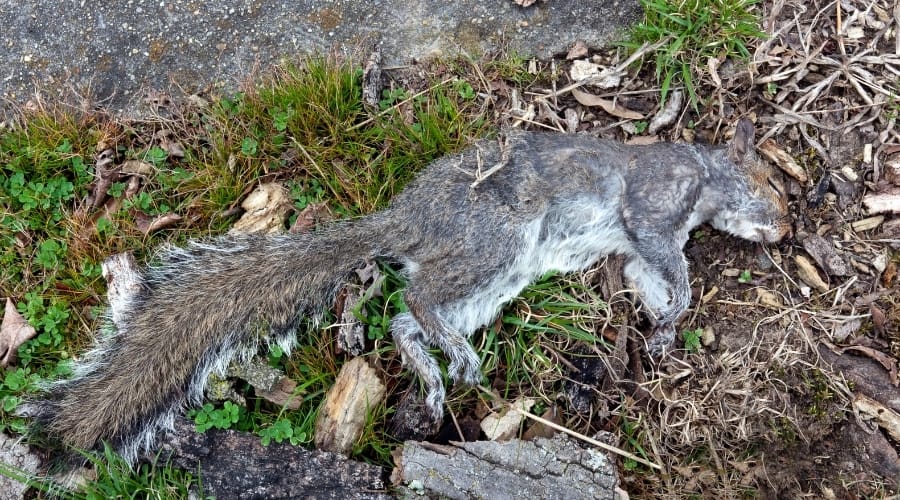Grey squirrels often live only a year or two. However, they can survive up to 12 years in the wild or an astounding 20 years in captivity.
Yet people rarely see a squirrel dead unless it was playing in traffic. As fast as they are, squirrels are far from mysterious, so where do squirrels go to die?
Table of Contents
Where Do Squirrels Go To Die
Squirrels will not go to a certain place to die. Instead, death happens upon them, typically at a fairly young age between 1 to 6 years. Common places to find the remains of squirrels who have died are squirrel nests in trees, underground burrows, on the side of the road and dung from animals who have eaten the squirrel.
Where Do Squirrels Go To Die Naturally
When a squirrel reaches the end of its natural life, it can likely sense something is off. The best evidence for this is where squirrels go to die naturally. Often an ill or older squirrel will ‘go to ground’ in its nest to pass away.
If they do this, there are two likely outcomes. Either the squirrel dies of whatever is wrong, or a predator sniffs it out. Their bodies slowly desiccate and rot in the first case, becoming only bones in a nest over months or years.
After the squirrel dies, its body will remain soft for a few hours. The next stage, rigor mortis, causes a stiffening of the corpse.
At this point, there is still little smell unless it is scorching outside. The tissues have not broken down yet. Although animals often defecate and empty their bladders (poop and pee) when they pass, not much else will happen for a while.
Once rigor mortis has passed, the tissues again soften up. It is at this point that microbes and fungus begin to take over, breaking down the tissues.
The smell will certainly be noticeable for days or even weeks if the body is left untouched.
Eventually, these microscopic living things, along with insect larva, will use up what remains of the meat and tissues leaving fur, ligaments, and bone behind to mark the creature’s passing.
Alternately, if predators get ahold of a dying or newly dead squirrel, they will eat it. Tiny carnivores may only chew at the body.
However, most larger animals will eat the entire squirrel. In many cases, the fur and bones will pass through the predator and end up in their dung. For owls, it comes out as a pellet.
Where Do Old Squirrels Go To Die
Elephants have graveyards, so do humans. Ants will remove the corpses of colony fellows to prevent a bacterial outbreak, but squirrels are not the brightest or philosophically deepest creatures. Moreover, relatively few squirrels die from old age.
Because they are active, most squirrels will get spotted by a predator and hunted down long before they can die of natural age-related causes.
Plus, as squirrels age, they are more likely to slow down, and as a result, get caught by a hungry animal.
Hawks, foxes, cats, and other small to medium-sized predators find a squirrel, at any age, to be a tasty treat.
Badgers, weasels, and even mountain lions will also gobble up a listless aging squirrel. It doesn’t take much in nature to fall behind and land in the jaws of a hungrier, younger animal.
If an old squirrel feels ill, it may retreat to its nest or den. Old squirrels would then die of dehydration or starvation when they have a deadly illness and weaken too much to care for themselves.
Other squirrels will not stop by to check on it with a snack or a cooling cloth for its head as they are highly territorial animals.
This may seem sad to us as a human, a pack animal, but it’s their way. Life moves on without a hiccup. Perhaps a predator gets an easy meal one night, or it may desiccate and rot inside its home.
According to Penn State, Great Horned Owls are fond of taking over squirrel nests, so an elderly or infirm squirrel would make a good meal while also offering a new ‘apartment’ the bird doesn’t need to clear out.
In the case of ground squirrels, there’s an even more disturbing possibility. Sure, a snake might grab it, but if the squirrel dies inside its home, it may get eaten by other ground squirrels.
These unsentimental creatures are cute but not terribly discerning about their food, and they are well-documented cannibals.
Where Do Squirrels Die
Squirrels typically die running from predatory animals. However, those lucky enough to make it home or live a very long life tend to die in their own nests.
Here are a few of the places you can find the remains of squirrels who have died.
- Pellets and Dung – The most common place to find evidence of a dead squirrel is in the droppings of other animals. Squirrels worldwide have a long list of predators. Though each is local to that region, they can consist of foxes, bears, raptors like eagles and hawks, and many other animals.
- Nest – In summer, squirrels make nests from leaves and sticks at the intersections of branches in trees. They tend to occupy a hole in a tree or other, hopefully, more sheltered locations for the winter. If a squirrel freezes, gets sick or infected or comes home severely injured, it will die inside its nest. Most squirrels who run from predators are trying to get home, or at least find some hidden bolt hole to curl up inside until the danger passes.
- Burrows (Ground Squirrels) – Ground squirrels have underground homes, as the name implies. Although their causes of death are the same, they instead dig out cozy places to sleep beneath the earth. A collapsed or unused burrow may contain what’s left of a dead ground squirrel.
- The Road – You will also see flattened squirrels on the side of the road, or sometimes in the middle of it. Since they have no real understanding of cars and can only run at a maximum speed of twenty miles per hour, getting hit and crushed is a real danger for squirrels who live near roads. Squirrels aren’t playing chicken when they seem to zig-zag around and taunt cars. According to How Stuff Works, this serpentine pattern works really well against predators, and they don’t understand that the car isn’t actively trying to ‘get them.’ It’s just instinct.
Helpful Tips To Know About Where Squirrels Go To Die
To some, squirrels are insolent and often destructive pests who bring fleas and steal birdseed. For others, they are adorable fluffy tail tree puppies to be cherished. Whatever your stance, you probably haven’t seen many dead squirrels.
Here are some helpful tips to know about where squirrels go to die.
- Squirrels can die of a heart attack or fright. Although this isn’t a common way to go, it can happen to any animal whose heart gets going too fast.
- Rabies is uncommon in squirrels, but they can catch it. It will make them act almost drunk most of the time, stumbling around with little muscle control or making circles. Eventually, this zoonotic disease will kill the squirrel.
- Squirrels also die from diseases they can get from ticks and fleas. Likewise, other insects like spiders can kill a squirrel if they bite them. Most bitten squirrels will try to make it home or find a spot to hide inside dense foliage or a log.
Final Thoughts
Like so many wild animals, squirrels rarely live to old age. It is part of the natural cycle that animals who become sick, weak, or slow tend to end up as a meal for other animals.
In some cases squirrels will even eat their own kind, though it’s not a first-choice meal. A very fortunate, healthy, and long-lived squirrel may survive twelve or more years if it can avoid hunters, cars, owls who want to eat it and move into its nest, accidents, and disease.
However, squirrels who die at home are just as likely to end up as food posthumously. Decaying corpses have an odor and plenty of animals scavenge remains for their meals.

